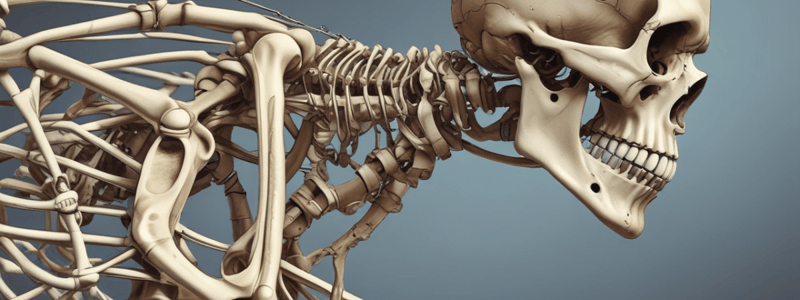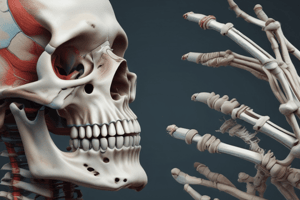Podcast
Questions and Answers
How many bones are in the human skeletal system?
How many bones are in the human skeletal system?
- 200
- 210
- 220
- 206 (correct)
Which of the following bones is NOT part of the cranial bones?
Which of the following bones is NOT part of the cranial bones?
- Frontal
- Mandible (correct)
- Parietal
- Sphenoid
What is the function of the lacrimal bone?
What is the function of the lacrimal bone?
- Forms a movable joint with C1
- Supports the nasal conchae
- Shaping the cheeks
- Contains a groove for the tear duct (correct)
Which part of the skeleton includes the upper extremities and shoulder girdle?
Which part of the skeleton includes the upper extremities and shoulder girdle?
How many bones make up the skull?
How many bones make up the skull?
Which of the following bones forms a movable joint with the atlas (C1)?
Which of the following bones forms a movable joint with the atlas (C1)?
How many bones are there in the adult skull?
How many bones are there in the adult skull?
What is the function of the fontanels in the fetal skull?
What is the function of the fontanels in the fetal skull?
What is the unique feature of the hyoid bone?
What is the unique feature of the hyoid bone?
What is the function of the curvature of the spine?
What is the function of the curvature of the spine?
Which of the following vertebrae has a dens?
Which of the following vertebrae has a dens?
What is the thorax composed of?
What is the thorax composed of?
What is the shape of the sternum?
What is the shape of the sternum?
How many parts does the sternum have?
How many parts does the sternum have?
Study Notes
The Skeletal System
- The skeletal system is composed of skeletal tissues that form bones.
- There are 206 bones in the human skeletal system.
Divisions of the Skeleton
- The skeleton is divided into axial skeleton and appendicular skeleton.
- Axial skeleton includes the skull, hyoid, spine, and thorax.
- Appendicular skeleton includes the upper extremities (shoulder girdle) and lower extremities (hip girdle).
Axial Skeleton - Skull
- The skull is composed of 28 bones: 8 cranial bones and 14 facial bones.
- Cranial bones: frontal, parietal, temporal, occipital, sphenoid, and ethmoid.
- Facial bones: maxilla, mandible, zygomatic, nasal, lacrimal, palatine, inferior nasal conchae, and vomer.
- Ear bones: malleus, incus, and stapes.
- The skull has sinuses, which are cavities in the bones.
Axial Skeleton - Fetal Skull
- The fetal skull has unique anatomical features that aren't seen in the adult skull.
- The fetal skull has 4 soft spots, referred to as fontanels, which allow the skull to be flexible during birth.
Axial Skeleton - Hyoid
- The hyoid bone is U-shaped and located above the larynx and below the mandible.
- The hyoid bone is suspended from the styloid processes of the temporal bone.
- The hyoid bone doesn't articulate with any other bones.
- The hyoid bone is involved in tongue movement and swallowing.
Axial Skeleton - Spine
- The spine is composed of 24 vertebrae: 7 cervical, 12 thoracic, 5 lumbar, 1 sacrum, and 1 coccyx.
- The spine has curvature, which gives strength to support the body and allow standing and walking.
- Vertebrae are stacked to give flexibility and strength to the spine.
- Each vertebra has a foramen, except C1.
- C2 has an upward projection (dens) to allow rotation of the head.
- C7 has a long, blunt spinous process.
- Vertebrae articulate with each other and with the ribs, iliac bones, and head.
Axial Skeleton - Thorax
- The thorax is composed of the vertebral column, sternum, and ribs.
- The sternum is 'dagger' shaped and located in the middle of the chest.
- The sternum has three parts.
Studying That Suits You
Use AI to generate personalized quizzes and flashcards to suit your learning preferences.
Related Documents
Description
This quiz covers the basics of the skeletal system, including the introduction to skeletal tissues, bones, and the divisions of the skeleton, with a focus on the axial skeleton.




